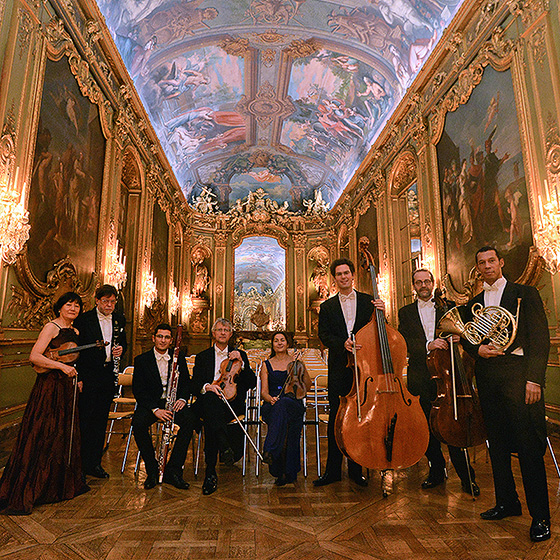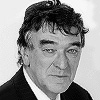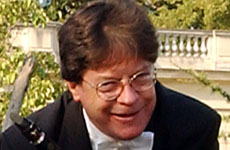The Octuor de France
The Octuor de France is currently the only permanent French ensemble of its kind. It is active in several different fields : classical music, contemporary music and the «live» accompaniment of the great classics of the silent cinema.

Chamber Music
Formed in 1979 by the clarinettist Jean-Louis Sajot, the principal objective of the Octuor de France is to interpret the chamber music repertoire written, for the main part, between the 18th century and the present day.
The musicians of the Octuor de France perform in variable formations going from duet to octet, with or without piano. They propose a wide repertoire of classical, romantic and contemporary works and also give their public the opportunity to rediscover forgotten or rarely played works. The Octuor de France commissions scores from present day composers to encourage the creation of new works.
In addition to its concerts in France, the Octuor de France regularly plays abroad : Japan, the United States, Spain, Italy, South America, Cyprus, Finland, Canada, Byelorussia, Australia…
The Projections-concerts
Since 1998, the Octuor de France has participated in the renewal of the silent cinema by commissioning original scores, written and directed by the composers Gabriel Thibaudeau and Antonio Coppola. Thirteen major works of the silent cinema are accompanied “live” throughout the world. In 2009/2010, the Octuor de France presented the following films :
In the USA at the National Gallery of Art, WASHINGTON – Poil de Carotte by Julien Duvivier
In Japan, KUROBE, YOKOHAMA and TOKYO – The Phantom of the Opera by Rupert Julian
In France PARIS, AUXERRE and SAINT JULIEN LES METZ – The Man who Laughs by Paul Leni
In France VENDOME, DIJON, NEVERS and PARIS – Poil de Carotte by Julien Duvivier
In France PARIS (Bibliothèque National de France) – Poil de Carotte by Julien Duvivier
EDMOND LEMAÎTRE
 Musicologue, historien, premier prix de Musicologie et d’Histoire de la musique du Conservatoire national supérieur de Paris est l’auteur d’une thèse sur l’orchestre , qui sera la base de la reconstitution de l’ensemble instrumental de Louis XIV, « Les Vingt-quatre Violons du roi ». Rédacteur pour plusieurs dictionnaires musicaux (Éditions Bordas, Fayard) il a dirigé le Guide de la musique sacrée – L’âge baroque (Fayard). Restituteur de Médée et des Leçons de Ténèbres de M.-A. Charpentier (Éditions du C.N.R.S.) ou encore des Concerts en Symphonies de Dauvergne (Éditions du C.M.B.V.) il est aussi le responsable éditorial de l’édition critique monumentale des Œuvres complètes de Claude Debussy pour les Éditions Durand. Directeur du Conservatoire de musique et de Danse de Massy (91), chargé de cours à l’Université d’Évry-Val d’Essonne, il mène une activité de conférencier pour des institutions prestigieuses et participe à des colloques internationaux. Depuis plusieurs années, il collabore avec l’Octuor de France dans le cadre de concerts-conférences.
Musicologue, historien, premier prix de Musicologie et d’Histoire de la musique du Conservatoire national supérieur de Paris est l’auteur d’une thèse sur l’orchestre , qui sera la base de la reconstitution de l’ensemble instrumental de Louis XIV, « Les Vingt-quatre Violons du roi ». Rédacteur pour plusieurs dictionnaires musicaux (Éditions Bordas, Fayard) il a dirigé le Guide de la musique sacrée – L’âge baroque (Fayard). Restituteur de Médée et des Leçons de Ténèbres de M.-A. Charpentier (Éditions du C.N.R.S.) ou encore des Concerts en Symphonies de Dauvergne (Éditions du C.M.B.V.) il est aussi le responsable éditorial de l’édition critique monumentale des Œuvres complètes de Claude Debussy pour les Éditions Durand. Directeur du Conservatoire de musique et de Danse de Massy (91), chargé de cours à l’Université d’Évry-Val d’Essonne, il mène une activité de conférencier pour des institutions prestigieuses et participe à des colloques internationaux. Depuis plusieurs années, il collabore avec l’Octuor de France dans le cadre de concerts-conférences.
 English
English Français
Français











